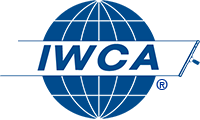November 30, 2015
By Albert Bernal, Millennium Building Services, Inc.
“I Just had my windows cleaned and they are still dirty… I saw your crew washing windows but I think they missed mine… I don’t understand why those spots didn’t come off… Can’t you just scrub a little harder to remove the stains?” These are typical calls that we receive about stained windows. In most cases the windows were cleaned and to fully understand why this occurs, some background information on glass composition and stain removal techniques is in order.
Glass is a hard, brittle and porous substance that appears flat, but in fact, consists of microscopic crests and crevices where mineral deposits and contaminants can imbed themselves and react with the silicates, lime and soda components of the glass. The most common of these is hard water that is transported from the water system on to the glass through the means of sprinkler systems or water-fed pole system (typically used to clean three story buildings). Other types of stains known as run down stains or back splash stains are caused by efflorescence (mineral deposits that have leached to the surface of the building). Rainwater washes these minerals down the building onto the windows, which are baked into the windows by the sun to produce the unsightly stains and scale that resist removal through conventional window cleaning methods.
The most common and inexpensive stain removing method used by window restoration companies is known as acid washing. Various acids (hydrofluoric, muriatic, hydrochloric, sulfuric and/or phosphoric) are applied to the surface of the glass with the express aim of having them combine with the contaminants for easy removal. The risk, and in many cases danger, lies in fact that the acids also combine with the materials that comprise the glass itself and thus can damage it through a process commonly known as etching. Peripheral materials are also in danger. Acids can kill plant life, damage caulking and sills, corrode aluminum window frames, stain building surfaces and can cause serious injury to the person applying them.
For all the above reasons, MBS does not offer acid washing as an option to our customers. Instead, we have developed a stain removal program that has been highly successful for the past 30 years. Environmentally safe products are used in combination with specialized buffers, leather pads and 3M white pads to produce the desired results. Time and again, we are called upon when other methods fail. We are proud of our reputation we have developed and would be pleased to furnish references of satisfied clients.
Preventive measures to consider include properly sealing building surfaces, redirecting sprinkler systems, hand squeegeeing all windows by boatswains chair or by using lift equipment and, if a water-fed pole system is used, make sure that the water has been d-ionized. MBS offers the state of the art d-ionizing system as an option to its customers.



